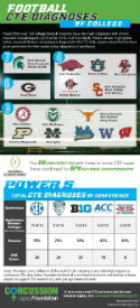(Boston) – The Concussion Legacy Foundation announced today that players from over 100 college football programs have now been diagnosed with Chronic Traumatic Encephalopathy (CTE), a degenerative brain disease that evidence indicates is caused by brain trauma. The data is from the VA-BU-CLF Brain Bank, a collaboration between the Department of Veterans Affairs, Boston University, and the Concussion Legacy Foundation.
Every conference within the college football Power 5 conferences (Atlantic Coast Conference (ACC), Big Ten, Big 12, Pac 12 and Southeastern Conference (SEC)) has at least one of its schools represented among the 15 college football programs with three or more confirmed cases of CTE. The 15 programs which have three or more confirmed cases have combined for 64 national championships.
“This information is being released to raise awareness that CTE is not just an issue for professional football players,” said Chris Nowinski, co-founder and CEO of the Concussion Legacy Foundation. “The data should not be interpreted to say that players from these schools are at greater risk than other college players. Instead, the data shows the widespread reach of this disease, and the commitment by the alumni and their families of these schools to support CTE research by participating in brain donation.”
| School | CTE Cases | Publicly Released Cases |
|---|---|---|
| Michigan State University | 7 | Earl Morrall, Dick Proebstle, Bubba Smith |
| University of Georgia | 6 | Paul Oliver |
| University of Arkansas | 4 | Lew Carpenter |
| Auburn University | 4 | Forrest Blue |
| Boston College | 4 | Ron Perryman |
| San Diego State University | 4 | Ralph Wenzel |
| University of Southern California (USC) | 4 | Eric Scoggins, Mosi Tatupu, Jeff Winans |
| University of Alabama | 3 | Ken Stabler |
| Colorado State University | 3 | Keli McGregor |
| University of Michigan | 3 | Rob Lytle |
| Purdue University | 3 | Dennis Wirgowski |
| University of Texas | 3 | Shane Dronett, Jim Hudson, Greg Ploetz |
| UCLA | 3 | |
| University of Washington | 3 | |
| University of Wisconsin | 3 |
| Conference | Member Colleges | Percent | CTE Cases |
|---|---|---|---|
| Southeastern Conference (SEC) | 11 of 14 | 79% | 28 |
| Pac-12 | 9 of 12 | 75% | 20 |
| Big Ten | 9 of 14 | 64% | 22 |
| ACC | 6 of 14 | 43% | 10 |
| Big 12 | 4 of 10 | 40% | 8 |
Thus far 91 percent of football players (138 out of 152) studied at the VA-BU-CLF Brain Bank who played in college have been diagnosed with CTE. Almost two-thirds of that group went on to play professional football. College football participation was compiled from public records and interviews with family members.
Greg Ploetz is one of the college football players represented in this cohort. A defensive tackle at the University of Texas who was part of the 1969 national championship team, he died of complications of dementia in May of 2015 at the age of 66. Ploetz never played football professionally, but started playing at the age of 10 and began to show signs of cognitive decline at the age of 60. His symptoms, which began as memory loss, confusion and headaches, worsened in his later years and led to loss of speech and dementia. Ploetz’s niece created a short film, “Art of Darkness: A Story of CTE,” capturing his decline and its effect on his family. View the film here.
The VA-BU-CLF Brain Bank, led by Ann McKee, MD, is the largest sports concussion and CTE repository in the world with over 375 brains donated and over 220 cases confirmed, comprising an estimated 70 percent of the confirmed CTE cases globally. Over 1,300 current and former athletes and military veterans have pledged to donate their brain to the Concussion Legacy Foundation, including NASCAR star Dale Earnhardt Jr., soccer legend Brandi Chastain, Cincinnati Bengals player Eric Winston, and U.S. Secretary of Veterans Affairs Robert McDonald.
Data gathered from the brain bank has inspired research programs focused on diagnosing and treating CTE in living athletes led by researchers at the VA and the Boston University CTE Center. For more information on donating to the VA-BU-CLF Brain Bank or to get involved, visit: http://concussionfoundation.org/get-involved.
